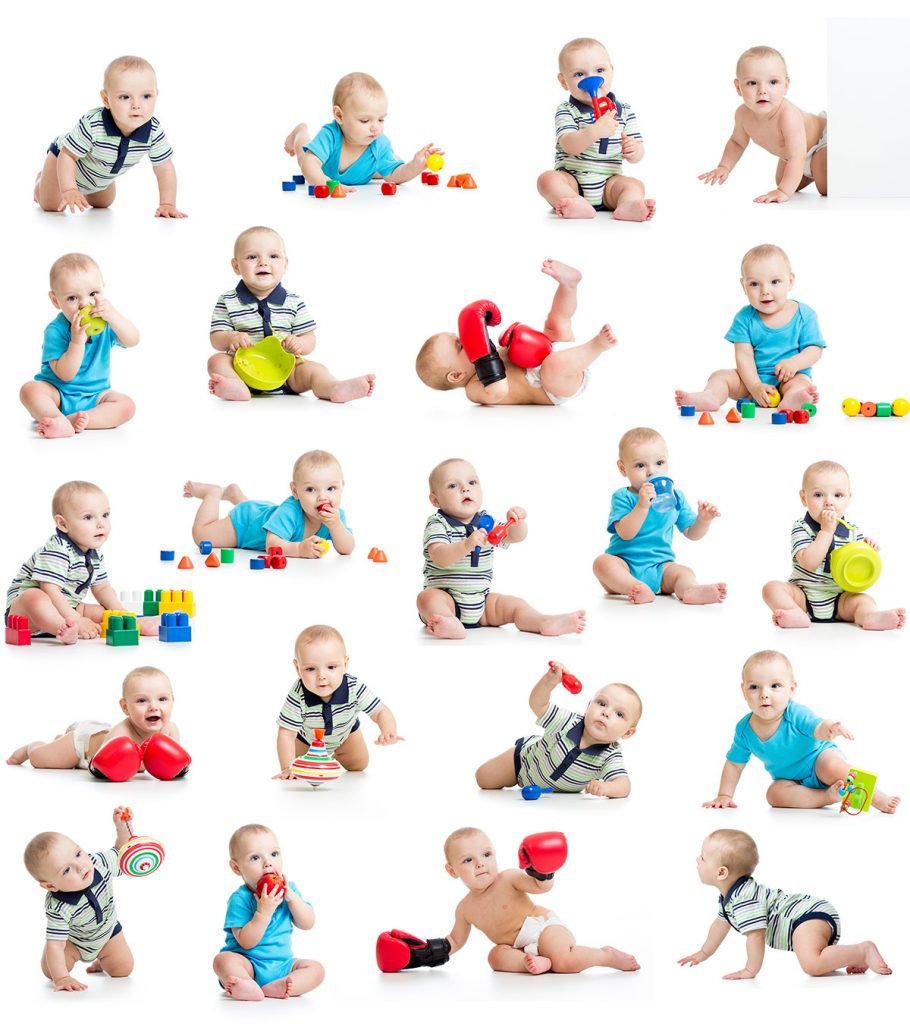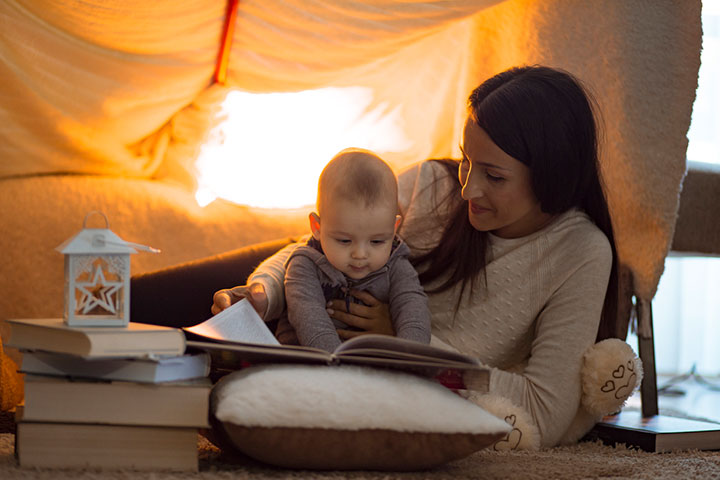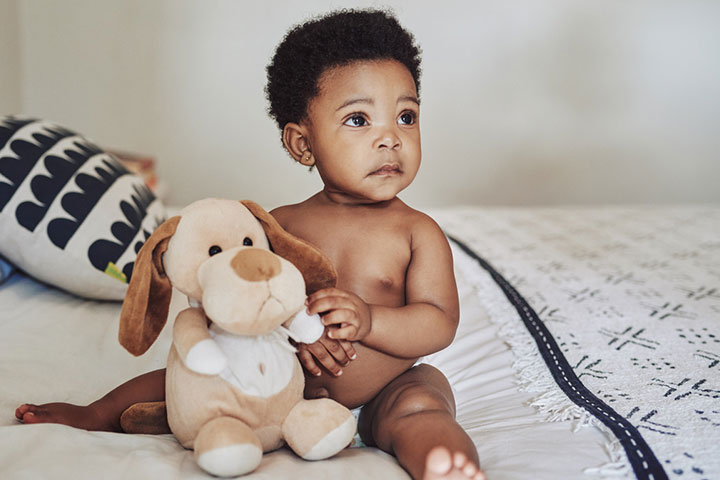Play Activities For Babies Aged 1 To 12 Months!
Babies require a lot of activity to help with their overall development. Play activities for babies aged 1 to 12 months are crucial to their physical and mental development. After adjusting to the complexities of motherhood after your childbirth, your next task is to feed your baby with the necessary tools required for their growth. Every activity you engage your baby in plays a role in their growth towards their milestones. The vibrant colors, sounds around them, shapes, and sizes that they witness foster their mind in several ways. So, here is a list of activities for babies below one year that stimulate them.
Baby Activities From Months 0 To 12
While aiding you into the sync of being a parent, the following activities will also help enhance your baby’s fine motor and logical thinking skills. We have come up with an interesting list of baby activities month by month from the time of birth till 12 months of age.
A. Newborn:
This phase is all about your little one gazing around at things, observing, trying to understand the surroundings around him. Your baby’s vision this time is limited. He can see things between 8 to 10 inches from his line of sight. This is the time to improve his visual stimulation, eye coordination and identifying new sounds. Here are some of the ideas for the playtime schedule of your toddler.
1. Rattles Rattle:
Rattles are a definite delight, because babies just love them! The sound also improves your baby’s auditory senses. You can start with a little rattle. Here is the how to do the activity for newborn baby:
- Try and place the rattle in between your baby’s fingers.
- Although he is too small to grasp, he will begin to feel and sense the object.
- You can also shake the rattle, slowly moving from one end to another, letting your baby to shift his eyes on the toy as the sound moves.
- Try not to rattle too loudly as this will scare your baby.
2. Happy Talk:
You need to strike off an active communication with your newborn.
- He is busy trying to understand the various sounds around him, including the speech pattern of the people around him.
- He will also try to communicate with those adorable gurgles and coos.
- Try to have a little happy chat with your little one.
- Make faces, funny sounds, converse; these things elevate your baby’s curiosity while building rapport with you.
B. One Month:
This time around, your baby is quite comfortable with his surroundings. This is an ideal time to enhance your communication with your infant as he goes about developing a penchant for words. He will also develop a keen sense of smell at this age. Below are a few baby learning activities in which you can engage your toddler with his auditory and speech skills.
1. Tube Conversations:
It’s very simple and cute.
- Take a cardboard tube roll that is left out of your used paper kitchen towels.
- Putting one end of the tube to your baby’s ear, try talking softly from the other end.
- Use phrases like ‘Hello pumpkin’, to longer phrases.
- Try talking in articulating tones so that your toddler starts relating to the same.
2. Finger Puppets:
You will need child friendly finger puppets, either made at home or bought from the market.
- Use them on each of your fingers to bring them slowly into your toddlers’ line of sight.
- Wait till he focuses on the faces.
- Introduce each puppet with simple names and phrases like “Hello, I’m Tom the Cat” etc.
- Make the puppets speak to each other in a funny way, so that your baby enjoys the indecipherable conversation with cuteness.
C. Two Months:
Your baby will advance in his auditory and sensory skills by the time he is two months old. You can now engage your infant with sound and sensory related activities. Below are the sensory activities for babies:
1. Paper Crumple:
You will notice your toddler getting startled at loud noises, reacting to different kinds of music, beats of drum, the sound of the pressure cooker in the kitchen, etc.
- Start creating different kinds of noises, so that your baby begins to get familiar with them.
- You can simply crumple a regular paper, wax paper, cellophane or toys that squeak. Your baby will immediately respond to that.
2. Up, Up And Away:
Your baby will love flying in the second month as his gross motor skillsiXThe ability to control and coordinate body movements such as walking and running. improve.
- To do this with caution, first sit up with your knees bent, with your baby’s tummy against your shins.
- Lie back on the floor while raising your legs slightly in the air.
- Say “Up, up and away” as your baby rises in the air.
- Enjoy those priceless gurgles.
D. Three Months:
Three months is a milestone of sorts in your baby’s life. He is most likely to imitate you talking on your cell phone, repeating a few words after you and making faces. Convert this yearning into a fun activity.
1. Telephone Talk:
Your toddler will now love to blabber or attempt gibberish. This is the best time to play the telephone game with your baby.
- Make your baby hold the telephone receiver as you pretend to talk to him from your cell phone.
- Maintain slow speech and long pauses letting your child try and respond in bits.
- With that cute jabber, the game tends to become super fun!
2. Playing Drums:
Playing drums with your child improves his auditory, rhyme, sense of cause and effect skillsiXThe ability of the child to comprehend why things happen the way they do..
- Take three plastic bowls and invert them.
- Now use a pair of wooden spoons or chopsticks and start drumming rhythmically with your baby.
- Make sure that this is done only under your supervision as your toddler is still too young and may hurt himself with the chopsticks.
E. Four Months:
Your baby will progress to the next level of communication by this time. You can initiate games that encourage your child to respond immediately and promote interaction.
1. Kicking Back:
Your darling will love this activity.
- Fill a baby bathtub with 3 to 4 inches of water.
- Holding your baby in an upright sitting position, watch as your baby experiences being in the water and kicking with his legs.
- The more he kicks, more water splashes around, making your little one enjoy the game in delight.
2. Ready, Steady, Go:
This game is apt to give enough practice to your baby’s fine motor and balancing skills.
- Your baby is more likely to roll over once he hits the four month mark.
- While he tries to crawl, place your little one on his tummy and press the palms of your hands against his soles.
- Observe your toddler’s movement as they attempt to move forward while you do the same.
F. Five Months:
Your toddler will now indulge in ‘object permanenceiXA child’s ability to know that objects continue to exist even though you cannot see or hear them.‘ – just because he can’t see something doesn’t mean it’s not there. He will enjoy the hide and seek games from here on.
1. Hide The Toy:
Make sure you are there with your baby all the time, while playing this activity. Also, if possible use soft boxes, made out of cloth or paper, that way your baby may not harm himself.
- Put your baby’s rattle or any of his favorite toys in a small box.
- Now enclose his box in a bigger box and again another big one, creating various layers.
- Ask your baby “Where’s your toy?” and point to the box.
- Watch your baby try to open one box after another.
- Ask him “Is your toy in there?” every time a box is opened.
- Watch your baby experience the thrill of discovery while finding the hidden toy.
2. Airplane Landing:
This is one of the most adorable things that you will begin to do as a mother.
- Your child will now follow the direction of the spoon while feeding.
- Play an ‘Airplane Landing’ game while spoon feeding your baby.
- Take a spoon of food that has to be fed and slowly start lending it like an airplane in the direction of your toddler’s mouth.
- Once he takes in the food, say ‘Airplane landed!’
G. Six Months:
This is the time when your toddler crosses the reputed ‘Six Month’ mark. It’s almost like hitting a half century! Make the most of his newly acquired skills to engage in fun games.
1. Photo Album:
Your little one will start to recognize various patterns, colors and shapes with this baby activity.
- Encourage socialization by creating vibrant photo albums containing pictures of friends and family that your baby will instantly recognize.
- You can also make his baby book and hand it over.
- Sit with your little one and go through the album every day.
- This way, your baby will get used to leafing through various pictures himself.
2. Building Blocks:
Now that your baby has developed a fine eye for shapes, this is the time to start the block games.
- Your child’s motor skills are well defined now and he will begin to hold, lift and drop things.
- Participate in the game initially till your child gets used to making shapes on his own.
H. Seven Months:
Your baby is now set to hear and respond more. His verbal and auditory skills will be constantly improving during which phase you have to introduce activities that help the same.
1. Storyboards:
Story time is an all time favorite activity among babies.
- Buy or make a storyboard with different shapes like animals and trees.
- Make a story out of them and tell your baby, holding him in your lap.
- Observe as your baby concentrates on the images and what you say at the same time, responding back with sounds.
2. Shower Game:
Babies love playing in the water, let’s see how to make it more interesting.
- Use clean plastic containers for this activity.
- Make holes in the lid of one container, fill water into the same and cap it.
- During your baby’s bath time, fill the container and close the lip.
- Invert the same for your baby to see the water splashing out.
- Make your baby do the same.
- This activity improves your child’s motor skills and response to cause and effect.
I. Eight Months:
Your little one will now start trying to stand up. He will also improve his hand-eye coordinationiXA complex cognitive ability that unites both visual and motor skills. during this time. You can help him improve his skill with fewer activities.
1. Kicking Game:
This one is an effective activity to develop your little one’s skills.
- Hold your baby from behind, with one arm around his chest and the other hand supporting his bottom.
- Keep a ball in front of his legs.
- Now help your baby kick the ball while holding him.
- Say “Kick’ every time he attempts to do it.
2. Noises:
Your baby will love making noises. So give him the required resources for the same.
- You can simply give him a spoon and a plate while putting him on his baby chair or give any sound making toys that he likes.
- Your child will now want to explore various sounds while making them with his hands.
J. Nine Months:
Starting this time, your baby will be in a phase of exploration. He will crawl, hide, walk, or simply sit in enclosed places. This is due to his increasing spatial relations and gross motor skills. The following activities for babies of nine months will help.
1. Under The Box:
Since your baby will love enclosures, try playing a game with him.
- Take a cardboard or a plastic box big enough for your baby.
- Making him get in and out of it.
- Make sure you are around your little one while he plays with boxes.
- Alternatively, you can make a small tent house for him.
2. Soft Toys:
Your baby will start bonding with his toy friends now.
- Buy him adorable soft toys that he can play with.
- Create a story where his toys play an important role, just like humans.
K. Ten Months:
Welcome to the advanced level of gross motor skill mastering. Your kid will now want to try climbing on top of things. So make use of resources that will enable him to practice better.
1. Cushion Climbing:
Perhaps one of the easiest and safest ways for your child to improve his climb. Place cushions of different shapes and sizes on the floor and make your baby climb up and down them.
2. Finger Food Game:
Take different bowls with your child’s favorite finger food, crackers, fruit slices, etc. Now place some empty bowls for him to transfer the contents and match the colors.
L. Eleven Months:
Your baby is one month away from turning one, and you will see a lot of transformation by this time. He will be more enterprising with you than he was during the first six months. Indulge in little big things like singing rhymes, songs, etc., your little one will now start singing along with you in case he has begun saying a few words.
M. Twelve Months:
Your baby is now one year old. A spree of activities is lined up for him, such as sing-along toys, block games, rhymes, shapes, etc., keeping him busy enough. All his gross motor, sensory, auditory, visual and linguistic skills would have taken to the next level here.
Theresa, a stay-at-home mother from New York, shares a few ideas on how she engages her son in sensory play. She mentioned that she started a ‘sensory bin’ for Lewis (her son) when he was only five to six months old. However, she was dispirited by the lack of ideas on what items to use. She came up with a few ideas of her own. She says, “Add ice cubes to the water. Lewis loves scooping up the ice cubes with his hands and sucking on them… Lewis had fun exploring some oatmeal while I was baking cookies one day.”
Regarding dry rice, she adds, “I haven’t felt comfortable giving it to Lewis yet because I know he is very oral with his materials (i).”
Another anonymous blogger shares what they use for their baby’s sensory box. They state, “So far, baby B has had a birdseed sensory bin, a waterbeads sensory bin, and today I put together this simple pan of large noodles, rice, and plastic shapes. I never took my eyes off of him and he did try to eat it twice, but the rest of the time was spent enjoying this new sensory experience! This simple sensory bin was played with longer than he’s ever played with any of his battery-operated toys. On my hardwood floors it was a simple cleanup with just a quick sweep, but if you have carpet, set your bins on a plastic table cloth for easy cleanup (ii)!”
There are interesting play activities for babies aged 1 to 12 months, such as happy talk, rattles rattle, finger puppets, tube conversations for newborns, telephone talk, hide the toy, building blocks for older infants. These activities will not only engage them but will also help to enhance their overall growth and development of cognitive skills, motor skills, logical thinking, and other skills. They will also help them to achieve their developmental milestones. But, before choosing any activity, ensure that it is suitable for your baby’s age.
Key Pointers
- Engaging your baby in play is not just fun, it’s vital for their growth as babies soak up the world around them in the first year of life.
- Use finger puppets, drum sessions, toy hiding games, storytelling, cushion climbing adventures, and sing-along moments to combine fun and play.
- Always be attentive to prevent mishaps like choking or accidental injuries during playing.
Discover fun activities to keep your 1 year old entertained at home! From sensory play to creative crafts, we’ve got a range of ideas to keep your little bundle of joy happily occupied.















